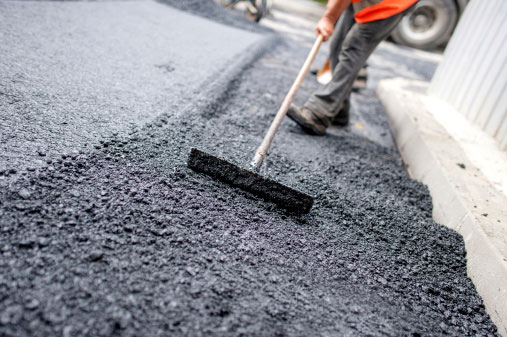Boost Pavement Performance: Cold Mix Asphalt Sealing Tips
Boost Pavement Performance: Cold Mix Asphalt Sealing Tips
Blog Article
Cold Mix Asphalt Vs. Hot Mix Asphalt: Which Is Right for You?

Composition Differences
Cold mix asphalt is created by emulsifying the asphalt binder with water and an emulsifying agent before blending it with accumulation. The warm mix asphalt manufacturing procedure involves warming the accumulation and asphalt binder independently before combining them at the asphalt plant.
Additionally, cold mix asphalt has a tendency to be much less thick and extra versatile than warm mix asphalt. This versatility makes it better fit for locations with higher levels of motion, such as driveways or roads with rush hour. On the other hand, hot mix asphalt is understood for its high durability and resistance to rutting and splitting, making it a recommended option for highways and high-traffic roads where longevity is critical.
Installation Process Differences
The procedure of installing cool mix and hot mix asphalt exhibits notable variances in their demands and treatments. In comparison, hot mix asphalt necessitates a more elaborate installation procedure. Due to the home heating needs, hot mix asphalt installations are normally lugged out by experts with specialized tools, guaranteeing a more structurally audio and long-term result.
Sturdiness and Long Life Elements
When taking into consideration asphalt choices, durability and long life are vital factors to review for lasting sidewalk efficiency. Hot mix asphalt (HMA) is known for its phenomenal toughness and long life. The high temperatures during the mixing and laying procedure enable for better compaction, leading to a denser and more powerful pavement structure. This brings about HMA being much more immune to rush hour loads, harsh weather condition problems, and the impacts of aging contrasted to cool mix asphalt (CMA)
In regards to durability, HMA typically outperforms CMA as a result of its remarkable toughness and resistance residential or commercial properties. HMA sidewalks have a longer solution life, calling for less constant repair services and about his maintenance, which can convert to set you back financial savings in the future. Additionally, HMA sidewalks are extra easily personalized to satisfy specific project requirements, additionally boosting their durability.
Cost Factors To Consider
Taking into consideration the financial ramifications is a crucial facet when assessing the selection between hot mix asphalt (HMA) and chilly mix asphalt (CMA) for pavement tasks. While the preliminary price of hot mix asphalt is commonly greater than that of chilly mix asphalt, HMA frequently provides a much more cost-efficient solution in the future due to its exceptional resilience and durability. HMA is recognized for its capacity to hold up against rush hour loads and harsh weather condition conditions, reducing the demand i loved this for frequent repairs and upkeep. On the various other hand, cool mix asphalt is more budget-friendly in advance however might need even more frequent patching and resurfacing, bring about higher upkeep prices with time.
In enhancement to material costs, it's vital to think about the expenditures linked with setup and maintenance when contrasting HMA and CMA. Ultimately, the decision between HMA and CMA should take right into account not simply the initial cost however additionally the lasting monetary implications to identify the most economical option for the details sidewalk job.
Environmental Effect Contrast
Contrast of the environmental effects in between warm mix asphalt (HMA) and chilly mix asphalt (CMA) discloses distinct distinctions in sustainability practices. HMA production needs high temperature levels, leading to boosted power usage and greenhouse gas emissions.
Additionally, the usage of CMA frequently entails reusing existing asphalt pavement, promoting source conservation and reducing the amount of waste sent out to garbage dumps. By choosing for CMA over HMA, roadway building projects can add favorably to ecological preservation initiatives.
Verdict
To conclude, the option in between cold mix asphalt (CMA) and warm mix asphalt (HMA) relies on numerous factors such as structure, installation process, sturdiness, durability, price, and environmental effect. cold mix asphalt. While CMA provides a quick and cost-efficient solution for small repairs, HMA makes certain premium resilience and longevity for rush hour locations. Consider these factors thoroughly to determine which sort of asphalt is the best choice for your paving requires

Thinking about the monetary ramifications is a weblink vital element when reviewing the option in between warm mix asphalt (HMA) and chilly mix asphalt (CMA) for pavement jobs. While the preliminary price of hot mix asphalt is typically higher than that of cold mix asphalt, HMA often gives a much more cost-efficient remedy in the lengthy run due to its exceptional toughness and long life. asphalt repair.Comparison of the ecological impacts in between warm mix asphalt (HMA) and chilly mix asphalt (CMA) discloses distinctive differences in sustainability techniques.In final thought, the selection between cold mix asphalt (CMA) and hot mix asphalt (HMA) depends on different aspects such as make-up, setup procedure, durability, long life, price, and ecological impact
Report this page